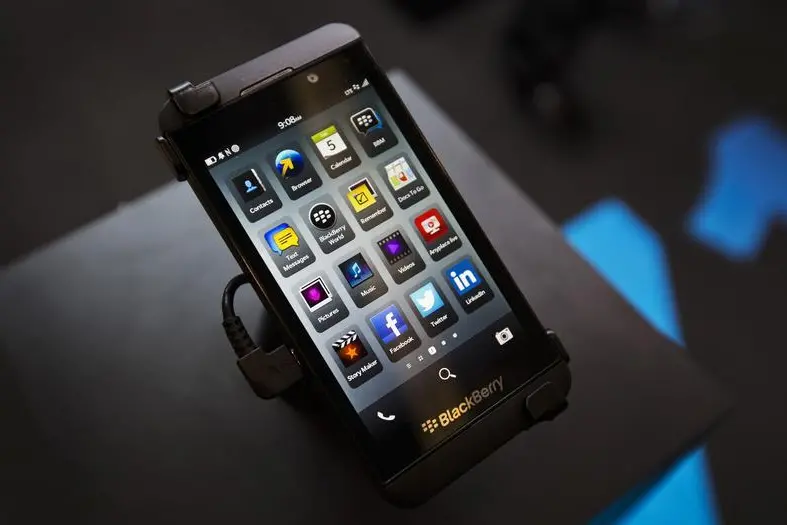PHOTO
29 September 2016
By Alastair Sharp BlackBerry Ltd's decision to outsource the development of its smartphones helps it avoid the risks of a competitive market and focus on its more lucrative businesses of software and managing rival devices, its chief executive said on Wednesday.
The company's shares (BB.TO)(BBRY.O) rose 5 percent as investors welcomed a further shift away the money-losing handset business, in which BlackBerry had gone from being a market leader to trailing far behind rivals like Apple Inc (AAPL.O).
In a model for how it plans to keep BlackBerry-branded handsets in the market, the company said it had signed a deal with Indonesia's BB Merah Putih to manufacture, distribute and promote new devices in that country, its largest handset market.
BlackBerry said it was in late-stage discussions for a similar deal in China and working on several India initiatives.
BlackBerry outsources phone design
Click here for more videos
"What we did was cut off the entire chain, and I'll take a royalty," Chen told reporters, noting it could now avoid inventory and supply chain costs. "I'm still in the handset business, but I'm in it in a profitable way."
Blackberry CEO John Chen speaks during their annual general meeting for shareholders in Toronto, Waterloo June 23, 2015. REUTERS/Mark Blinch Chen said less than 100 jobs would be lost from its latest move away from making hardware.
The change would likely weigh on overall revenue for two more quarters before software revenue growth makes up for the decline, he said.
Revenue fell to $334 million in the fiscal second quarter ended Aug. 31 from $490 million in the year-ago period, missing analysts' estimates of $393.75 million.
"This is an entirely sensible decision and probably an overdue one," said IDC technology analyst John Jackson. "Software revenue and the margin profile associated with that is where the focus should have been, and now can be."
BlackBerry said revenue from software and services was $156 million in its second quarter, down from $166 million in the first quarter. The device business accounted for $105 million in revenue.
Excluding large one-time costs, the company said it broke even in its second quarter. On that basis, analysts had on average expected a loss of 5 cents a share, according to Thomson Reuters I/B/E/S. BlackBerry raised its full-year earnings outlook to a range of breakeven to a loss of 5 cents a share, excluding special items. It had previously expected a loss of 15 cents a share.
(Reporting by Alastair Sharp in Waterloo; Additional reporting by Allison Martell in Toronto; Editing by Lisa Von Ahn and Richard Chang)
© Reuters 2016
By Alastair Sharp BlackBerry Ltd's decision to outsource the development of its smartphones helps it avoid the risks of a competitive market and focus on its more lucrative businesses of software and managing rival devices, its chief executive said on Wednesday.
The company's shares (BB.TO)(BBRY.O) rose 5 percent as investors welcomed a further shift away the money-losing handset business, in which BlackBerry had gone from being a market leader to trailing far behind rivals like Apple Inc (AAPL.O).
In a model for how it plans to keep BlackBerry-branded handsets in the market, the company said it had signed a deal with Indonesia's BB Merah Putih to manufacture, distribute and promote new devices in that country, its largest handset market.
BlackBerry said it was in late-stage discussions for a similar deal in China and working on several India initiatives.
BlackBerry outsources phone design
Click here for more videos
"What we did was cut off the entire chain, and I'll take a royalty," Chen told reporters, noting it could now avoid inventory and supply chain costs. "I'm still in the handset business, but I'm in it in a profitable way."
Blackberry CEO John Chen speaks during their annual general meeting for shareholders in Toronto, Waterloo June 23, 2015. REUTERS/Mark Blinch Chen said less than 100 jobs would be lost from its latest move away from making hardware.
The change would likely weigh on overall revenue for two more quarters before software revenue growth makes up for the decline, he said.
Revenue fell to $334 million in the fiscal second quarter ended Aug. 31 from $490 million in the year-ago period, missing analysts' estimates of $393.75 million.
"This is an entirely sensible decision and probably an overdue one," said IDC technology analyst John Jackson. "Software revenue and the margin profile associated with that is where the focus should have been, and now can be."
BlackBerry said revenue from software and services was $156 million in its second quarter, down from $166 million in the first quarter. The device business accounted for $105 million in revenue.
Excluding large one-time costs, the company said it broke even in its second quarter. On that basis, analysts had on average expected a loss of 5 cents a share, according to Thomson Reuters I/B/E/S. BlackBerry raised its full-year earnings outlook to a range of breakeven to a loss of 5 cents a share, excluding special items. It had previously expected a loss of 15 cents a share.
(Reporting by Alastair Sharp in Waterloo; Additional reporting by Allison Martell in Toronto; Editing by Lisa Von Ahn and Richard Chang)
© Reuters 2016





















